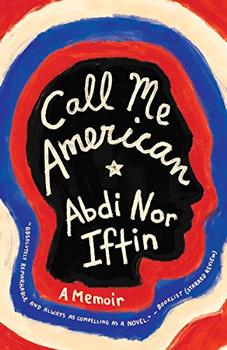Summary | Excerpt | Reviews | Beyond the Book | Read-Alikes | Genres & Themes | Author Bio

A Memoir
by Abdi Nor IftinThis article relates to Call Me American
As a young boy growing up in war-torn Mogadishu, the capital of the East African country of Somalia, Abdi Nor Iftin and his brother Hassan often looked for enterprising ways to support their family. They stumbled onto a lucrative business when they started selling the qat leaves they gathered from the ground around market stalls or stole from trucks transporting the crop. But a nasty run-in with the local militiamen who were the main buyers of this crop, ended this enterprise.
So what is qat? It's a plant native to the Horn of Africa and the Arabian peninsula. It is also known as khat, gat, and miraa. Qat (pronounced "cot") is a multibillion dollar industry and a public health epidemic. Its leaves, when chewed and stored in the cheek, are a stimulant similar to either caffeine or amphetamines, depending on whom you ask. Despite generally being considered a mild stimulant with moderate physiological addiction, qat is proven to be psychologically addictive as well. Though the leaves can be dried and brewed into tea, they are at their most potent when chewed directly. The plant's popularity is evident in the bustling markets where it is sold legally in Somalia, Ethiopia, Kenya, and Yemen, where users, mostly men, have been reported to spend close to $800 a month on the leaves.
 There is no question about qat's effect on users. The stimulant is known to cause hyperactivity, euphoria, arousal, confidence, and an increase in concentration. However, the drug can also cause a loss of appetite, insomnia, an increase in heart rates and blood pressure, not to mention depression and a risk of heart attacks among long-term users. Yet many supporters, which include Kenyan and Somali heads of state, insist that qat is no more a stimulant than caffeine.
There is no question about qat's effect on users. The stimulant is known to cause hyperactivity, euphoria, arousal, confidence, and an increase in concentration. However, the drug can also cause a loss of appetite, insomnia, an increase in heart rates and blood pressure, not to mention depression and a risk of heart attacks among long-term users. Yet many supporters, which include Kenyan and Somali heads of state, insist that qat is no more a stimulant than caffeine.
Demand for qat has been growing as residents from the crop-growing areas continue to migrate to Europe and the US. Since the early 1990s, it is estimated that about 2,500 to 2,800 metric tons of qat entered the UK each year, yielding valuable revenue to countries such as Kenya, Somalia and Yemen where qat is grown. Recent data is scarce, but according to a World Bank report, a whopping 30% of Yemen's economy in 2000 was based on the plant.
Over the years, sentiments against qat have increased in many countries, and there are debates about whether its usage constitutes a health epidemic. Britain banned imports of the crop in 2014. Nevertheless, its continued popularity among people in the Horn of Africa and the Arabian Peninsula, and with the diaspora around the world, ensures that qat will remain a lucrative cash crop in developing nations.
Picture of Yemeni man chewing qat by Ferdinand Reus
Filed under Cultural Curiosities
![]() This "beyond the book article" relates to Call Me American. It originally ran in May 2018 and has been updated for the
May 2019 paperback edition.
Go to magazine.
This "beyond the book article" relates to Call Me American. It originally ran in May 2018 and has been updated for the
May 2019 paperback edition.
Go to magazine.
Your guide toexceptional books
BookBrowse seeks out and recommends the best in contemporary fiction and nonfiction—books that not only engage and entertain but also deepen our understanding of ourselves and the world around us.